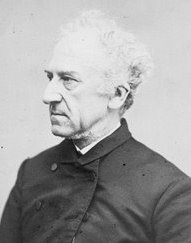Benjamin Waterhouse Hawkins
| Benjamin Waterhouse Hawkins | |
|---|---|
 |
|
| Born |
8 February 1807 London, United Kingdom |
| Died | 27 January 1894 (aged 86) |
| Nationality | British |
| Education | St. Aloysius College |
| Known for | sculptor and natural history artist |
| Notable work | Crystal Palace Dinosaurs |
| Awards | Member of the Society of Arts Fellow of the Linnean Society Fellow of the Geological Society of London |
Benjamin Waterhouse Hawkins (8 February 1807 – 27 January 1894) was an English sculptor and natural history artist renowned for his work on the life-size models of dinosaurs in the Crystal Palace Park in south London. The models, accurately made using the latest scientific knowledge, created a sensation at the time. Hawkins was also a noted lecturer on zoological topics.
Benjamin Waterhouse Hawkins was born in Bloomsbury, London on 8 February 1807, the son of Thomas Hawkins, an artist, and Louisa Anne Waterhouse, the daughter of a Jamaica plantation family of apparent Catholic sympathies. He studied at St. Aloysius College, and learned sculpture from William Behnes. At the age of 20, he began to study natural history and later geology. He contributed illustrations to The Zoology of the Voyage of HMS Beagle. During the 1840s, he produced studies of living animals in Knowsley Park, near Liverpool for Edward Stanley, 13th Earl of Derby. The park was one of the largest private menageries in Victorian England and Hawkins' work was later published with John Edward Gray's text as "Gleanings from the Menagerie at Knowsley" . Over the same period Hawkins exhibited four sculptures at the Royal Academy between 1847 and 1849, and was elected a member of the Society of Arts in 1846 and a fellow of the Linnean Society in 1847. Fellowship of the Geological Society of London followed in 1854.
Meanwhile, possibly due to Derby's connections, Hawkins was appointed assistant superintendent of the Great Exhibition of 1851 in London. The following year, he was appointed by the Crystal Palace company to create 33 life-size concrete models of extinct dinosaurs to be placed in the south London park to which the great glass exhibition hall was to be relocated. In this work, which took some three years, he collaborated with Sir Richard Owen and other leading scientific figures of the time: Owen estimated the size and overall shape of the animals, leaving Hawkins to sculpt the models according to Owen's directions.
...
Wikipedia
